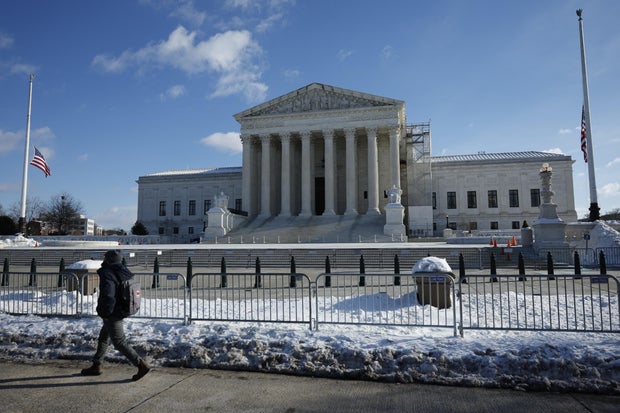Why does the U.S. government want to ban TikTok?
Lawmakers and intelligence agencies have long had suspicions about the app’s ties to China and have argued that the concerns are warranted because Chinese national security laws require organizations to cooperate with intelligence gathering. FBI Director Christopher Wray told lawmakers last year that the Chinese government could compromise Americans’ devices through the software.
In classified briefings, lawmakers have learned “how rivers of data are being collected and shared in ways that are not well-aligned with American security interests,” Democratic Sen. Chris Coons of Delaware said last year.
In its filings to the Supreme Court last month, the Justice Department argued TikTok “collects vast swaths of data about tens of millions of Americans, which the [People’s Republic of China] could use for espionage or blackmail. And the PRC could covertly manipulate the platform to advance its geopolitical interests and harm the United States — by, for example, sowing discord and disinformation during a crisis.”
Congress prohibited TikTok on federal government devices in 2022, and a majority of states have barred the app on state government devices.
How the case arrived at the Supreme Court
TING SHEN/AFP via Getty Images
TikTok and ByteDance filed a legal challenge last May that called the law “an extraordinary and unconstitutional assertion of power” based on “speculative and analytically flawed concerns about data security and content manipulation” that would suppress the speech of millions of Americans.
“In reality, there is no choice,” the petition said, adding that a forced sale “is simply not possible: not commercially, not technologically, not legally.”
A federal appeals court issued a ruling in December that upheld the law, saying the U.S. government “acted solely to protect that freedom from a foreign adversary nation and to limit that adversary’s ability to gather data on people in the United States.”
A week later, the appeals court denied TikTok’s bid to delay the law from taking effect pending a Supreme Court review.
On Dec. 16, TikTok asked the Supreme Court for a temporary pause, saying it would suffer “immediate irreparable harm” if the ban is not delayed.
Two days later, the Supreme Court said it would take up the challenge to the law under an expedited timeline. It scheduled arguments for Jan. 10, nine days before the law takes effect.
What happens if the law takes effect
App stores, like those operated by Google and Apple, and internet-hosting companies will be barred from distributing TikTok. That means Americans who have already downloaded the app will be unable to update it, eventually making it obsolete. Those who have not downloaded the app will be unable to do so.
The government could impose penalties on the tech companies that continue to host TikTok on their platforms. The law does not penalize Americans for using the app.
Last month, the leaders of the House China Committee sent letters to Apple and Google telling them to be ready to remove TikTok from their app stores by Jan. 19.
The ban would be lifted if TikTok and ByteDance ever part ways.
But there are several pathways to avoid a ban outside of Supreme Court intervention, experts told CBS News. Read more about those options here.
When does the TikTok ban law take effect?
The law is set to take effect on Jan. 19, one day before President-elect Donald Trump’s inauguration.
In April, Congress swiftly passed the bipartisan legislation, known as the Protecting Americans from Foreign Adversary Controlled Applications Act, as part of foreign aid package. It was signed into law by President Biden.
The law gave TikTok nine months to sever ties with its Beijing-based parent company ByteDance, with the possibility of a 90-day extension if a sale was in progress by the January deadline. Absent a sale, TikTok is supposed to lose access to app stores and web-hosting services in the U.S. beginning on Jan. 19.
